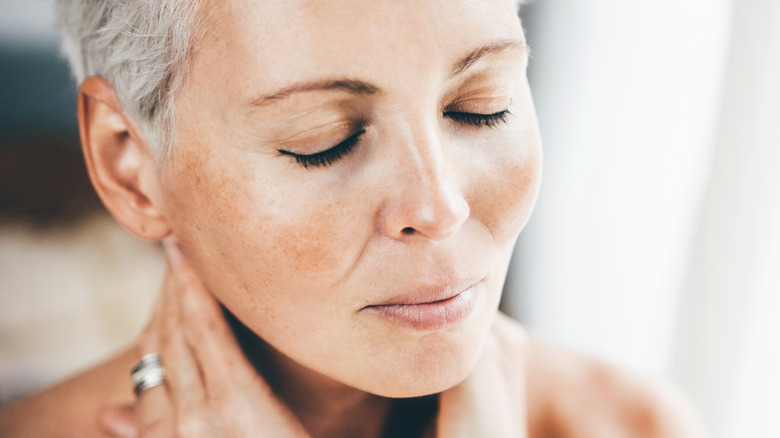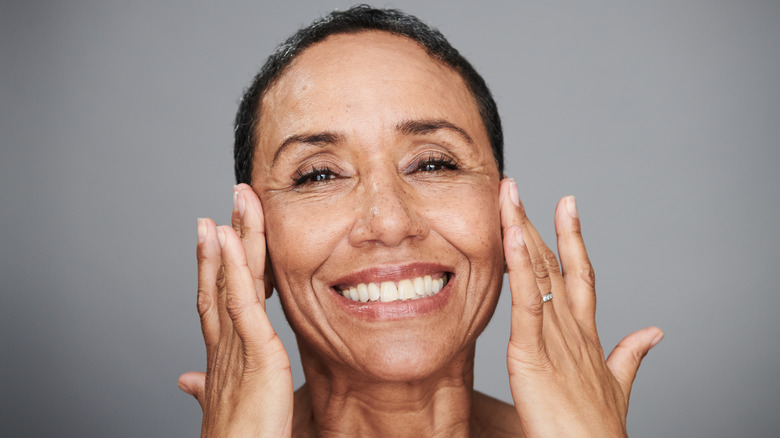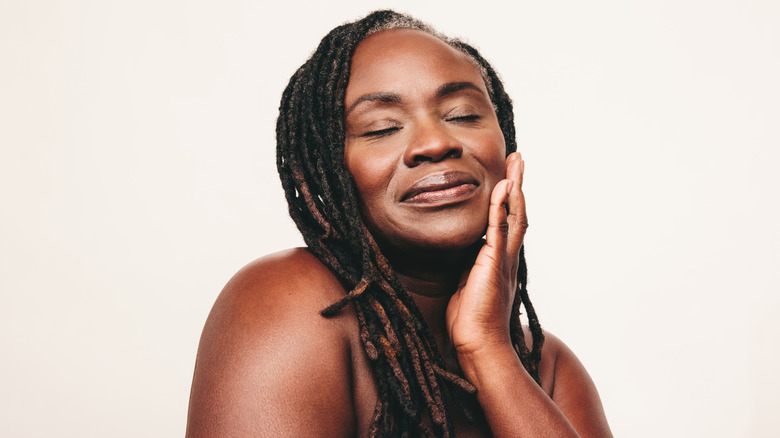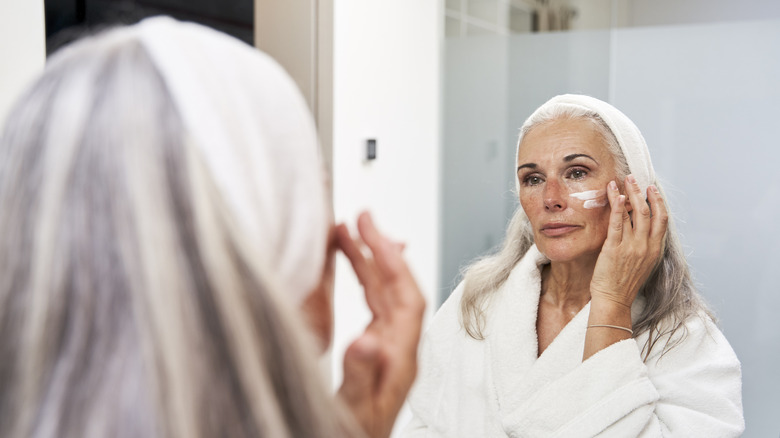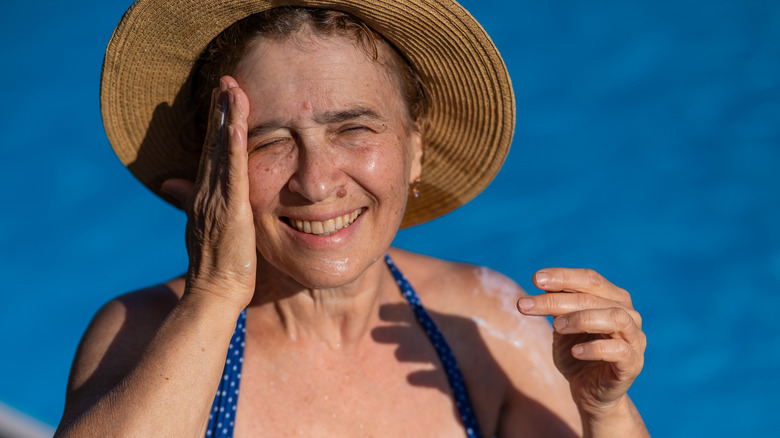How To Adjust Your Skincare Routine To Cater To Mature Skin
We may receive a commission on purchases made from links.
You can have great skin at any age. That said, over time, our complexion's texture changes, which means you must adapt your routine accordingly. "Skin is considered 'mature' around the late 30s to 40s as collagen declines, causing wrinkles, sagging, and dryness," Dr. Aanand Geria, a dermatologist at Geria Dermatology exclusively tells us. "Thinning skin, slower cell turnover, and uneven pigmentation from sun exposure are key signs."
Genetics have a huge determining influence on skin aging. Still, you have some control over how your skin ages. Lifestyle is a major factor; smoking, alcohol, stress. Sun exposure can also age skin prematurely. A healthy diet will also impact aging skin and can help you avoid skincare concerns like glycation. Adopting good skincare practices early in life can help keep the effects of aging at bay. But it's not all about prevention.
For lifelong beautiful skin, you should adapt your skincare approach to respond to your skin's new needs. "Pay attention to protection, healing, and hydration as your skin ages," says Geria. "As you age, consistent and customized treatment encourages stronger, healthier skin." You won't always have the plump dewy skin of a twenty-year-old but you can glow at any age.
Prioritize hydration
Aging skin is often subject to dryness. "Rich moisturizers support the preservation of the skin barrier," says Dr. Aanand Geria. Ingredients like hyaluronic acid, ceramides, glycerin, and omega fatty acids all nourish and hydrate. They replenish and hydrate, plumping skin to reduce the appearance of fine lines.
Skin naturally contains hyaluronic acid and ceramides but, over time, produces less and less of these substances that help to keep skin elastic and hydrated. These ingredients combat dryness, and contribute to younger-looking skin. So products are rich in these hydrating ingredients are a good choice for aging skin, as they replenish the natural skin barrier, helping skin to hold onto the moisture it already has. "It can hold up to 1,000 times its weight in water, making it an excellent skincare ingredient to attract and bind water to the skin," explains board-certified dermatologist Dr. Dendy Engelman in an interview with People.
Embrace anti-aging ingredients
Not all skincare products are created equal. That means different formulas are going to deliver active ingredients better suited for aging skin. While everyone's skin varies to some degree, you'll likely want to prioritize products that boost hydration and support your skin barrier, which is likely to weaken with age, according to Dr. Aanand Geria.
"Add peptides for stiffness, retinoids for collagen support, and hyaluronic acid for moisture," says Geria. Other ingredients that can benefit maturing skin include niacinamide and azelaic acid, both of which can target discoloration, fight inflammation, and boost the skin barrier.
Finally, there's Vitamin C — a major skincare powerhouse. Vitamin C can fade dark spots, reduce fine lines, repair sun damage, and even stimulate collagen production.Try to find a formula that contains ascorbic acid, as this form of Vitamin C is likely to be most effective. A product like La Roche-Posay's Pure 10% Vitamin C Serum delivers a high-powered concentration of active ingredients without being so potent that it will harm your skin; it's a good option if you're noticing signs that your current vitamin C isn't working for you. By delivering a boost of antioxidants, it can help keep skin healthy and glowing, no matter how many laugh lines you've earned over the years.
Cleanse gently
As we mentioned above, protecting your skin's natural barrier only becomes increasingly important as your skin ages. A compromised barrier can result in irritation and redness, which is unwanted at any age. Plus, you skin won't regulate moisture as well — a problem when you are already working to combat dryness and keep skin looking plump.
So, as you age, it's a good time to reevaluate your cleansing routine. Ditch harsh cleansers for creamy, hydrating options that are specifically formulated for dry or aging skin. "To avoid irritation, stay away from aggressive exfoliants and very drying treatments," says Dr. Aanand Geria. If you do use toner or exfoliants, make sure the formulas are gentle, and don't contain aggravating ingredients like alcohol or added fragrance.
Other products that can take a toll on delicate, aging skin? Products formulated for wrong skin type, overuse of strong active ingredients, or anything texturally abrasive like rough scrubs, brushes, or clothes. With skincare, it's better to focus on gentle, consistent care, rather than risk overzealous treatment that damages your skin.
Don't skip SPF
It's never too late to become religious about your broad-spectrum sunscreen. No matter your age, UV damage can lead to prematurely aged skin and dark spots. Those can be hard to reverse once you have them so an ounce of prevention is worth several pounds of cure. Some experts even suspect that SPF can reverse signs of aging. In fact, regular sunscreen use is probably the single best strategy for ensuring beautiful lifelong skin And that's not just for your face. It's equally important to be mindful of any body parts that get regular sun exposure, like your neck and décolletage — and don't overlook your hands.
Even if you already contend with sun damage or dark spots, it's not too late to think about protecting your skin. "Sunscreen is still necessary," insists Dr. Aanand Geria. Find a sunscreen you like enough to use it frequently — ideally as part of your daily routine. Formulas like Paula's Choice RESIST Youth-Extending Daily Hydrating Fluid SPF 50 offer broad-spectrum protection in addition to antioxidants to fights signs of aging, giving you two-in-one benefits for aging skin.
